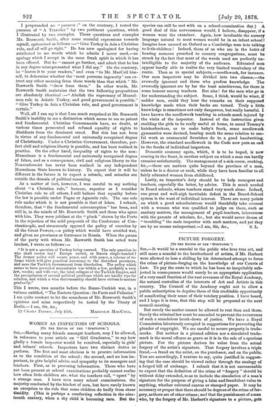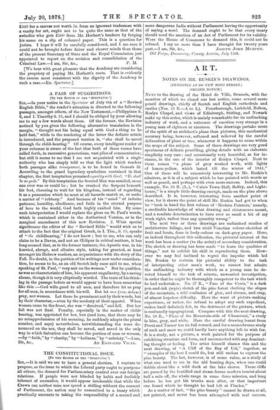PICTURE FORGERY.
[TO THE EDITOR OF THE " SPECTATOR.") Sin,—It would be a scandal to the public who love true art, arid' still more a scandal to the brotherhood of artists, if Mr. Herbert were allowed to lose a shilling by his determined attempt to force- the crime of picture-forging on the knowledge of our Courts of Law. To pay the costs to which he has been so inequitably sub- jected in consequence would surely be an appropriate application. of a very small fraction of the vast revenues of the Royal Academy, the natural custodian of the interests of Art and Artists in this- country. The Council of the Academy ought not to allow a public subscription to deprive them of this creditable opportunity of manifesting their sense of their tutelary position. I have heard,. and I hope it is true, that this step will be proposed at the next council-meeting.
But surely the matter cannot be allowed to rest then and there.. Surely the criminal law must be amended to prevent the recurrence of such a scandalous break-down of justice. We have a Royal Commission laboriously occupied in suggestions for preventing the plunder of copyright. We are careful to secure property in trade- marks. But neither in a pirated edition nor a simulated trade- mark is the moral offence so grave as it is in the sale of a spurious picture. For the picture derives its value from the actual forgery of the artist's signature. That forgery involves a triple fraud,—a fraud on the artist, on the purchaser, and on the public. You are accordingly, I venture to say, quite justified in suggest- ing that the case should be viewed rather through the analogy of a forged bill of exchange. I submit that it is not unreasonable to expect that the definition of the crime of " forgery " should be without delay extended, so as to include the simulation of a man's signature for the purpose of giving a false and fraudulent value to anything, whether coloured canvas or stamped paper. It may be necessary or proper that there should be degrees of the crime of for- gery, as there are of other crimes; and that the punishment of a man who, by the forgery of Mr. Herbert's signature to a picture, gets
1500 for a canvas not worth 5s. from an ignorant tradesman with a vanity for art, ought not to be quite the same as that of the swindler who gets £500 from Mr. Herbert's bankers by forging his name on a slip of coloured paper. This is a question for jurists. I hope it will be carefully considered, and I am sure it .could not be brought before fairer and clearer minds than those of the present Secretary of State and the Royal Commission just appointed to report on the revision and consolidation of the [We hear with great pleasure that the Academy are considering the propriety of paying Mr. Herbert's costs. That is evidently the course most consistent with the dignity of the Academy in such a case.—En. Spectator.]



































 Previous page
Previous page